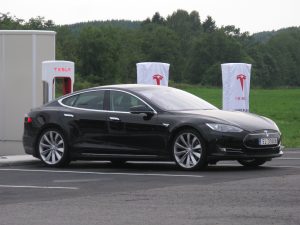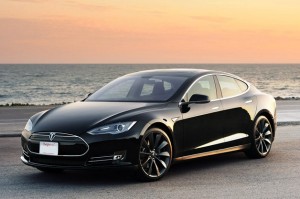11 item(s) were returned.
Research Analyst
Fuel Freedom Foundation
It seems like every week another major automaker announces it will “electrify” its vehicle lineup. In just the past few months, Mercedez-Benz, Ford, Audi, Maserati, GM, BMW, and more have committed to electrification by adding more electric vehicle (EV) options to their fleet. What makes these announcements particularly intriguing is that many of the automakers are following the electrification model of Volvo. They’re not just offering a few brand-new vehicles that run solely on electricity. They’re building plug-in hybrid models that can use both gasoline and electricity, and hyper-efficient models that run solely on gasoline but utilize an electric motor… [more]
View InsightAdvisor
Fuel Freedom Foundation
Last week, the Tesla Model S, an electric-powered car, received the National Highway Traffic Safety Administration’s highest mark in its history of ranking cars. Consumers Reports granted the Tesla Model S ninety-nine out of 100 points in their overall measure of vehicles and Motor Trend magazine named the Model S the 2013 Car of the Year. While Tesla’s increasing appeal may lead the way toward increasing market penetration for electric vehicles (EVs) in the future, real competition, at the present time and for some time to come, will depend upon opening up the present-restrictive gasoline market to alternative fuels, like… [more]
View InsightAt the Methanol Policy Forum – held March 27, 2012 in Washington, DC – energy industry and policy experts convened to discuss the fuel’s potential as a transportation fuel. The Forum’s opening remarks were made by DOE Assistant Secretary David Sandalow, who offered that methanol offered advantages as a transportation fuel but also brings along some challenges. Among the advantages: “First, and perhaps most important, methanol is inexpensive to produce. At today’s low natural gas and high oil prices, methanol could help reduce fuel costs consumers pay at the pump. “Second, methanol is a liquid at room temperature. It doesn’t… [more]
View InsightJ.C. Ward Jr. Professor of Nuclear Energy Engineering
Cornell University
The President said in his State of the Union Address, “And nowhere is the promise of innovation greater than in American-made energy.” He then talked about opening federal land for oil and gas exploration, implied that relying on foreign oil is not a good thing, and stated, “This country needs an all-out, all-of-the-above strategy that develops every available source of American energy a strategy that’s cleaner, cheaper, and full of new jobs.” Considering the President’s all-of-the-above platform, and the goals implicit in it, we’d be wise to evaluate our national relationship to oil. The U.S. currently produces around 7.6 million… [more]
View InsightUniversity Distinguished Professor
Michigan State University, Dept. of Chemical Engineering
The past century can rightly be called the Age of Oil. World oil consumption grew from about 20 million metric tons/year in 1900 to nearly 4000 million tons/year in 2005—a 200 fold increase. The economic activity enabled by oil consumption also greatly increased both human wealth and the human population size over the last century. But it is also clear that the Age of Oil is winding down. It is obvious, but often forgotten, that we must discover oil before we can produce, refine and use it. Worldwide, the rate of discovery of new oil reserves peaked in the 1960s.… [more]
View InsightNote: Synopsis drawn from the report. Synopsis intended solely for the purpose of generating discussion. Blueprint for a Secure Energy Future by the Obama Administration Demand for oil in countries like China and India is growing, and the price of oil will continue to rise with it. We need to make America more secure and control our energy future by harnessing all of the resources that we have available and embracing a diverse energy portfolio. Beyond our efforts to reduce our dependence on oil, we must focus on expanding cleaner sources of electricity, including renewables like wind and solar, as… [more]
View InsightNote: Synopsis based on OurEnergyPolicy.org review of draft legislation as well as media summaries. Synopsis intended solely for purposes of generating discussion. Key provisions of H.R. 1687, the Open Fuel Standard Act of 2011 (as of May 5, 2011) Would require defined percentages of light-duty automobile manufacturer’s inventory to operate on nonpetroleum fuels in addition to, or instead of, petroleum-based fuels along the following timetables 50% of new vehicles in 2014 80% of new vehicles in 2016 95% of new vehicles in 2017 and each subsequent year Qualified vehicles would include passenger automobiles and light-duty motor vehicles which: operate solely… [more]
View InsightNote: Synopses taken from Congressional Research Service summaries. H.R. 1476 & S. 835 H.R. 1476 S. 835 Requires each light-duty automobile manufacturer’s annual covered inventory to comprise at least: 50% fuel choice-enabling automobiles in years 2012-2014; and 80% fuel choice-enabling automobiles in 2015, and in each subsequent year. Requires each light-duty automobile manufacturer’s annual covered inventory to comprise at least: 50% fuel choice-enabling automobiles in years 2012-2014; and 80% fuel choice-enabling automobiles in 2015, and in each subsequent year. Defines “fuel choice-enabling automobile” as: a flexible fuel automobile capable of operating on gasoline, E85, and M85; or an automobile capable… [more]
View Insight[Note: The statements below are intended solely to stimulate discussion among the Expert community, and do not represent the position of OurEnergyPolicy.org. Text in italics indicates clarification or expansion.] The main recommendation is to let the free market do its work. It is likely that gasoline prices will continue to rise over the next 20 years and as a result will encourage consumers to buy more efficient cars, drive less, use more public transportation, live closer to work, etc. Government intervention is required only to nurture the market for oil replacement. The last oil shock and the new economic… [more]
View InsightCritical policy recommendations mentioned above (Flex Fuel GEM mandate, Alternative fuel infrastructure tax credit, and Government vehicle purchase mandate). We must solve the “chicken and egg” problem of the alcohol fuel market by forcing demand. Any newly built gasoline station should be able to carry any alcohol fuel in all pumps. Improve the methanol distribution infrastructure. Eliminate anti-competitive practices in gasoline distribution. Exempt gas station owners from exclusivity clauses if they cannot bu1y mixed blends from their exclusive supplier. The current law is not sufficient. Gasoline companies’ use of anti competitive practices to stifle blended fuel distribution should be stopped,… [more]
View Insight
